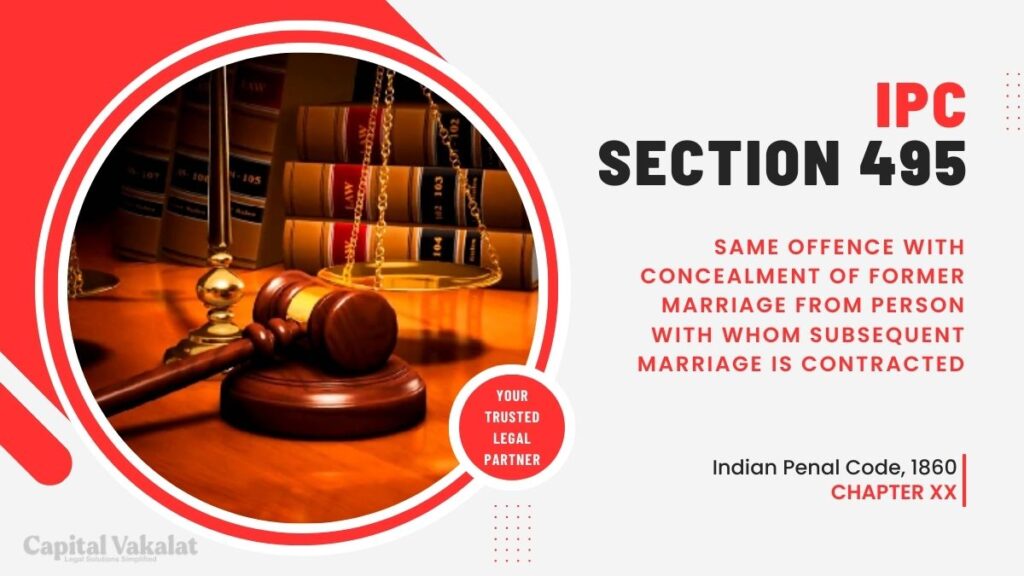In the labyrinth of legal codes that govern our society, Section 495 IPC stands as a distinctive provision, addressing a specific facet of marital relationships.

This article delves into the intricacies of Section 495 IPC, exploring the nuances of the offense related to concealing a former marriage from the person with whom a subsequent marriage is contracted.
Understanding Section 495 IPC
At its core, Section 495 of the Indian Penal Code (IPC) deals with the offense of marrying again during the lifetime of a spouse. However, the unique aspect of this provision comes to light when there is concealment of a former marriage from the person with whom a subsequent marriage is contracted. The section aims to maintain transparency in marital relationships and ensure that individuals enter into such unions with full knowledge of their partner’s marital history.
Concealment of Former Marriage
Concealment of a former marriage involves intentionally withholding information about one’s previous marital bonds. This act raises ethical and legal concerns, as it interferes with the right of an individual to make informed decisions about their marriage. From a legal standpoint, the consequences of concealing a former marriage can be severe, leading to potential legal actions against the offending party.
Person with Whom Subsequent Marriage is Contracted
Section 495 IPC focuses not only on the individual concealing their previous marriage but also on the person with whom the subsequent marriage is contracted. This underscores the importance of mutual disclosure in marital relationships. The law recognizes the right of an individual to be aware of their partner’s complete marital history, as it can significantly impact the nature and validity of the subsequent marriage.
Historical Context
To comprehend the full scope of Section 495 IPC, it is essential to explore its historical evolution and the legal precedents that have shaped its interpretation. Over the years, this section has undergone modifications, reflecting changes in societal norms and values. Analyzing historical context provides valuable insights into the intentions behind its formulation.
Penalties and Punishments
The violation of Section 495 IPC invites legal consequences, and understanding the penalties associated with this offense is crucial. This section explores the potential punishments, drawing on real-life case studies and examples where individuals faced legal actions for concealing their former marriages.
Challenges and Controversies
No legal provision is without its share of criticisms and debates. Section 495 IPC is no exception. This part of the article delves into the challenges and controversies surrounding the section, examining differing legal perspectives on its application and the need for potential reforms.
Importance of Disclosure
Advocating transparency in relationships, this section emphasizes the importance of disclosure in marital affairs. It explores the implications of honesty and openness, not just from a legal standpoint but also for fostering trust and understanding in relationships.
Real-life Cases
To illustrate the real-world impact of Section 495 IPC, this part of the article presents documented cases where individuals found themselves entangled in legal proceedings due to the concealment of former marriages. Examining these cases provides practical insights into the application and outcomes of this legal provision.
Conclusion
In conclusion, Section 495 IPC serves as a safeguard against the concealment of former marriages, promoting transparency in marital relationships. This article has explored the various dimensions of this legal provision, from its historical context to the real-life implications it carries. As society evolves, so too must our understanding and application of laws that govern the intricacies of human relationships.
Frequently Asked Questions
What is the maximum punishment for violating Section 495 IPC?
The legal consequences vary, and the maximum punishment depends on the specific circumstances of each case. It is determined by the court after considering the evidence presented.
Can a person be prosecuted under Section 495 IPC if they were unaware of their spouse’s former marriage?
Section 495 IPC typically requires intent, so if a person genuinely had no knowledge of their spouse’s former marriage, they may have a legal defense.
Are there any exceptions or defenses in cases involving Section 495 IPC?
Legal defenses may vary, and specific circumstances can impact the outcome. It is advisable to consult with legal experts to understand the nuances of each case.
Is there a statute of limitations for cases related to Section 495 IPC?
The statute of limitations for offenses under Section 495 IPC depends on the jurisdiction and the nature of the legal action. It is essential to consult legal experts for accurate information.